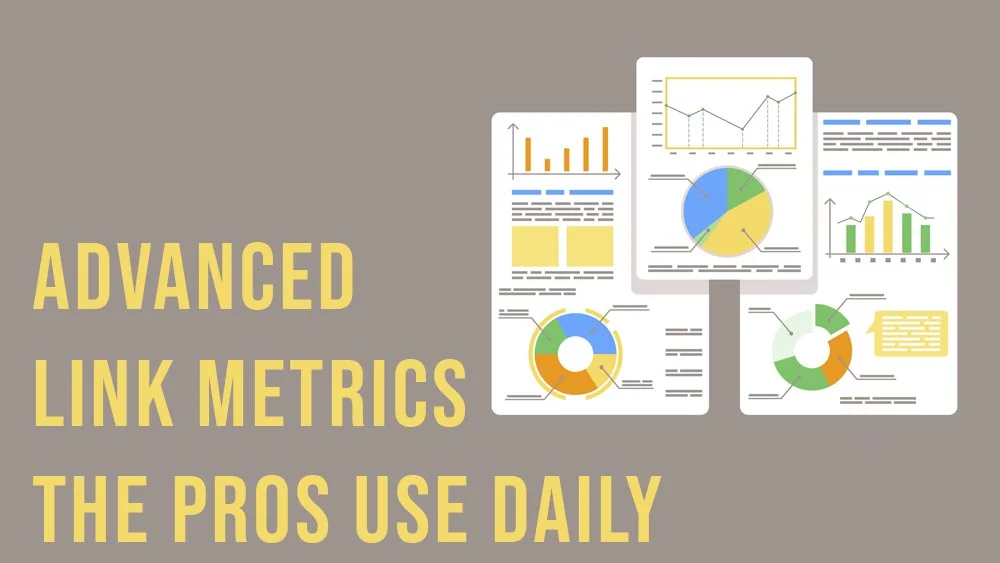The Ultimate Guide to Advanced Link Metrics for Professionals
The Ultimate Guide to Advanced Link Metrics for Professionals
You are probably well aware of the power that you may gain from link development. You are aware of how much of an effect it may have on your SEO. Additionally, it may have an effect on the ranks you get on the SERP. That is not a secret at all. On the other hand, you might not be familiar with the particular link metrics. Ones that you should use to establish whether or not your approach to building links is successful. Your rankings, domain authority, and passive traffic you receive will all improve. That is if you have a good link-building plan.
What Are Link Metrics?
Link Metrics is an umbrella term that refers to the various factors that determine the order in which search results are shown. They include some amount of domain authority, relevancy, and trust. Additionally, they reflect the prominence of any specific webpage on the world wide web. It is a method for evaluating websites not based on how significant their webmasters believe them to be. But rather on how authoritative, relevant, and trusted the opinions of other internet users are.
The ranking of a page on a search engine results page (SERP). Ones like Google, Yahoo, or Bing is based on a number of different variables. Backlinks, which refer to the quantity and quality of links on other websites that point to your website, are one of the aspects that play a significant role in search engine rankings. Backlinks have effectively allowed the main search engines to outsource the responsibility of quality control previously held in-house to web publishers.
They came to the conclusion that, at least as of right now, no artificial intelligence or search spider is as successful as a real human eye. That is when it comes to judging the quality of a webpage. As a result, they want people, not computers or algorithms, to perform the quality control work for them. They hold the belief that reputable websites can only link to other reputable websites.
The Different Types of Link Metrics That Are Associated With SEO
Link metrics come in some varied forms that we will be discussing in detail. In this guide we will discuss the following link metrics:
- Root Domains
- C-blocks
- Domain Authority
- Page Authority
- Link Position
- Link Traffic
- Link Relevance
Read below to understand each metric along with the impact it has on SEO and it’s success.
Root Domains: A Quick Overview
It is tempting to try to tally the number of backlinks that point to your website. You should be able to count to a large number. Know whether there are any domains that appreciate the material that you have created for them. And I like how that feels. "Look at all my links!" you exclaim. "Aren't they great?" you might ask.
However, here's the catch: If the links you provided are useful, links that originate from a variety of different domains are far more beneficial. When you receive a large number of backlinks from a single domain, the benefits of those backlinks to your rankings will not be as significant as when you receive a range of connections from a number of other sites.
Having a number of different links on a number of different websites that can be relied on is essential to the success of any link-building plan. If you want to get the most value out of backlinks, then you should focus your work on generating connections through domains that have rarely linked to you before. This will allow you to extract the maximum amount of value from backlinks.
C-Blocks: What Are They?
Have you ever come across anything known as C-Blocks? There are undoubtedly quite a few of you who have not. But that's not a problem. This is the reason you're in this room.
An IP address is the first step in the process. In its most basic form, an IP address is a numeric identifier that search engines like Google and others use to locate and access your website. The C-Block comes third in the sequence of integers that make up the code. It comes after the first two periods and just before the final period. In this instance, that indicates that the number in the C-Block is 132. Why is it so vital to remember that three-number code? By using a code that is unique to your website, search engines can determine where your website is located.
But that's not the only thing it can accomplish. If a search engine comes across another website that is hosted on an IP address that has the same C-Block as yours, then the search engine will associate your website with the other website under the assumption that the two websites are buddies online.
The trouble with this is that search engines will group you with other websites that are hosted in the same location as you. That is if you choose a cheap hosting service or host your website in a place that also hosts other websites. This could work to your advantage or disadvantage, depending on how you look at it. If you want to steer clear of linking yourself to a large number of websites that you are not familiar with, you should think about hiring someone to discreetly host your website.
Domain Authority: One of The Main Link Metrics for SEO

You are familiar with the concept of domain authority, aren't you? If you haven't already, now would be a good time to start. Domain strength, also known as domain authority, is an overall rating of your website in search engine results pages (SERPs) that takes into consideration the aggregate authority of all of the pages.
Visit this website, which is a domain authority checker, in order to determine how authoritative your domain is. Simply enter your URL, check the box that says "I'm not a robot," and then click the button that says "Perform check."
The scale goes from one to one hundred. Your entire domain authority will improve proportionately to the total score you receive. However, checking the authority of your own domain is not the most crucial thing to do. There is something else. You need to make sure that the domain authority of the websites that connect to you is checked. Your rankings will improve thanks to those backlinks in direct proportion to the scores of the friendly websites that link to you.
Page Authority: Common SEO Link Metrics
There may be times when you will have the opportunity to receive a link from a page that already exists on a website, as compared to a new page that is made specifically for a blog post or news item. In other words, there will be times when you will have the opportunity to get a link from an existing page. An example of this would be the addition of your link to an already existing list of some kind. For instance, maybe a page that ranks the finest espresso in Chicago would include your coffee shop as one of the options.
In circumstances such as this one, you need to determine the quality of the page in order to determine the value of the link to you before you commit a significant amount of time and effort to obtaining it. Using Page Authority is one method that can be utilized to do this.
Page Authority is another link and SEO statistic that is very similar to Domain Authority. The primary difference between the two is that Page Authority only pertains to a single page. That is as opposed to a whole domain. If the page you desire a link from has a high Page Authority, there is a better chance that it will assist you with your search engine optimization efforts.
Link Position: A Less Known SEO Link Metric That Pros Use
Although all backlinks are advantageous (provided that they are not spam), the links that are displayed first on a particular website are the ones that carry the most weight. What exactly do we mean when we say this?
What we mean is that the links that appear initially within the HTML of a piece of writing or a web page count more than the links that appear later on in the same place. The placement of a link can be significant since it can have an impact on how search engines evaluate the link in terms of its relevance and value.
those that are located higher up on a page are typically regarded as being more essential than those that are located further down on the page. This is due to the fact that search engines operate under the presumption that links that show higher on the page are more likely to be clicked on by visitors and are, as a result, more pertinent to the content of the page.
Link Traffic: A Worthy SEO Link Metric

There is just one method that accurately determines how valuable a backlink actually is. It makes no difference how well you rank, how high your domain authority is, or how useful the link is to your site. It refers to the amount of traffic that is coming to your website as a result of using that backlink.
When it comes to SEO, professionals evaluate the traffic that each backlink receives to the best of their abilities and then attempt to make the most of those connections by either increasing the number of backlinks on a domain that already receives a lot of traffic or using links from a second tier to increase the value of a backlink that already exists.
You can find out where the visitors to your website are coming from by navigating to Google Analytics and selecting the "Source/Medium" tab from there. Your traffic will improve even more if you focus your attention on accumulating additional backlinks from such domains.
Link Relevance: An Important Metric That You Won’t Do Without

While having numerous backlinks to your site is beneficial for SEO. You should know that it's equally crucial to make sure that the links are relevant. What are relevant links, exactly?
Having appropriate anchor text for your backlinks is part of what we mean, but I don't just mean that. Additionally, we refer to obtaining backlinks from websites that are related to your topic or sector. If I link to your website but my website isn't about digital marketing, for example. Let's say Google knows that your website is about digital marketing, that confuses the search engine, which makes it harder for it to accurately rank me.
The message is consistent, and the backlink is more valuable and important if my website also focuses on digital marketing. Make sure the websites from which you are obtaining backlinks are ones that are relevant to your sector, just like the pros.
Anchor Texts: An SEO Link Metric That Specifies Everything
The anchor text is the clickable text on in a hyperlink. Anchor text should be specific to the page that you are connecting to rather than being generic, as this is recommended by best practices for SEO.
The blue text that is underlined is the most typical form of anchor text because it is the online standard. However, it is possible to modify both the color and the underline by editing the HTML code. One of the many indications that search engines employ to ascertain the subject matter of a web page is the keywords that are included in the anchor text.
Final Thoughts
With link building and SEO, you have to fully understand what you can do and how you can implement certain metrics in order to reach what you want. With Google penalizing lots of link building activities and putting on some strict guidelines for link exchanging, most people tend to ignore the fact that swapping links can help you rank higher and increase the rate of your domain authority.
That is why we come to you today with the ideal solution for your concerns. Our newest link exchange platform will help you swap links easily. Furthermore, get to know more networks or platforms with high domain authority. That is why we advise you to sign up, get started, and take your website to the next level with our link exchange domain.

Comments
Post a Comment